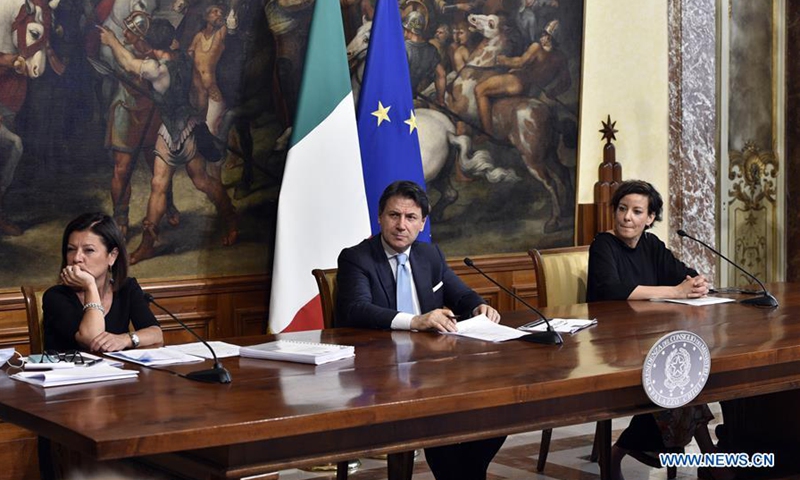
Italian Prime Minister Giuseppe Conte (C) attends a press conference in Rome, Italy, on July 7, 2020. Italian Prime Minister Giuseppe Conte unveiled a simplification plan on Tuesday aimed at bringing the country quickly out of the coronavirus emergency through massive infrastructure spending, among other measures. (Alberto Lingria/Pool via Xinhua)
Italian Prime Minister Giuseppe Conte unveiled a simplification plan on Tuesday aimed at bringing the country quickly out of the coronavirus emergency through massive infrastructure spending, among other measures.
In a televised press conference, Conte promised the new Simplification and Digital Innovation Decree will streamline Italy's notoriously bloated, slow and inefficient bureaucratic apparatus in order to jumpstart his Recovery Plan, which include 120 billion euros (136 billion U.S. dollars) worth of public works, a high-speed train network in the country's chronically impoverished south, and a national fiber-optics network.
"Cabinet has approved a decree which finally simplifies, speeds up, and digitalizes administrative procedures, unblocks all public works and public contracts procedures, once and for all," Conte said.
"This measure represents the basis for our Recovery Plan, which contains reforms and measures for which we will request financing in Europe," the prime minister explained.
He also announced that he will depart later in the day for "a tour of various European capitals" to explain Italy's strategy ahead of the next European Council meeting to be held in Brussels on July 17-18, when EU leaders will discuss the recovery plan to respond to the COVID-19 crisis and a new long-term EU budget.
"This reform is the springboard Italy needs right now," Conte said. "We are in an emergency, and this decree will make our country more agile, modern and competitive."
The prime minister went on to assure the public that cutting red tape and speeding up administrative procedures do not mean the government is letting its guard down against organized crime, which operates by bribing its way into lucrative public contracts through networks of complicit public officials.
"We absolutely do not want to offer space to criminal appetites, which distort (market) competition and accumulate illicit earnings," Conte said.
A key part of the decree is streamlining procedures for awarding public works contracts to companies, Conte explained.
The measures include eliminating competitive open tenders for projects worth up to 150,000 euros (up from the previous threshold of 40,000 euros).
For public works contracts worth 150,000 euros to 5 million euros, there will be negotiated procedures without competitive open tenders, while for projects worth 5 million euros and up, there will be a shortened competitive bidding process, Conte said.
Conte also said that his government's decree will "revolutionize" the current situation by rewarding public officials who take responsibility and sign off on public works, instead of rewarding those who keep them tied up.
"Currently we are in a perverse situation," said Conte. "The official whose career advances is the one who remains inert. The one who takes on responsibilities, paradoxically, risks (legal) exposure."
"Public officials must be put in the condition to greenlight public works," he said. "From now on, whoever authorizes a public work will only be liable for financial damages to the Treasury in cases where there is ... intentional malicious behavior."
"However, omissions and therefore delays and inertia will become punishable," Conte explained. "We will strike at the public official who slows down or impedes procedures, and no longer at the one who takes on the responsibility of signing off on a project."
Another "revolutionary" reform, Conte said, is that "from now on, any red tape that imposes additional financial burdens on citizens must be compensated for by an equal cut in bureaucratic costs."
The new decree also cuts red tape for renewable energy projects, including the installation of charging stations for electric vehicles, contains incentives for towns of under 20,000 residents to use electricity from renewable sources, and fields an extraordinary maintenance plan for forests and mountains.
